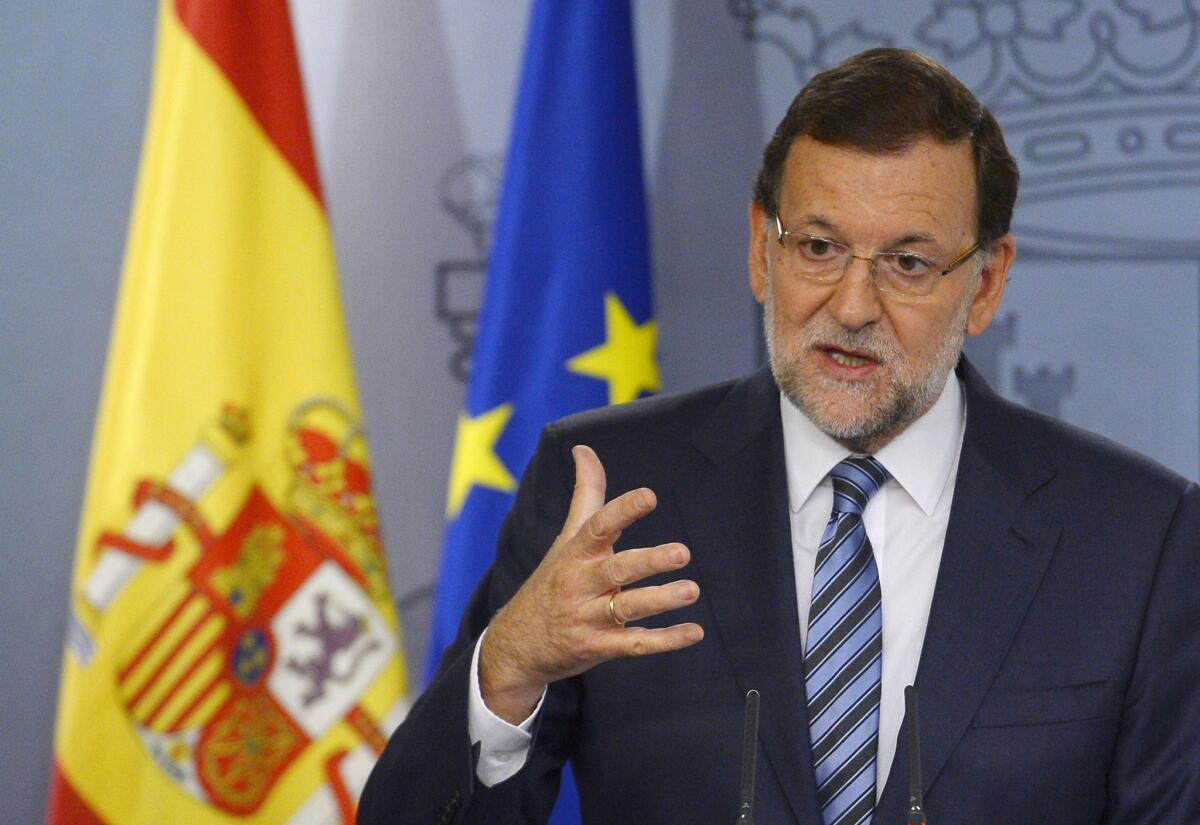Spain’s high court puts brakes on Catalan independence bid

In a unanimous decision, Spain’s Constitutional Court on Monday halted plans by the northeast region of Catalonia to hold a referendum on independence.
The Catalan parliament and regional leader Artur Mas had declared a Nov. 9 non-binding vote on secession from Spain. A majority of town councils in the northeastern Spanish region also approved the plan. But Spanish Prime Minister Mariano Rajoy lodged a 100-page appeal in the country’s highest court Monday, requesting that Catalonia’s plans be ruled illegal.
“It’s clearly against our constitution, which says national sovereignty corresponds to everyone... and that no part [of the whole] can decide for everyone,” Rajoy said in a televised statement after an emergency Cabinet meeting. “Nobody will be allowed to break up Spain.”
By accepting the appeal, the court’s 12 judges effectively suspended the Catalan referendum, thereby making any preparations for it -- which are already underway -- illegal, at least until the court definitively rules on Madrid’s legal challenge. It must do so within five months.
The move solidifies a legal face-off between the Spanish government and Catalan leaders, backed by hundreds of thousands of pro-independence protesters who have flooded the streets of the Catalan capital, Barcelona, in recent weeks.
While the Constitutional Court held an extraordinary session Monday night, Mas, the Catalan president, held a simultaneous news conference to present a 1,300-page “white paper” outlining his region’s plans toward independence. He suggested those plans would go ahead.
“Details of the Nov. 9 vote have been perfectly planned, perfectly prepared,” Mas said. “This is not a unilateral declaration of independence but a consultation of the will of the Catalan people.”
Mas has sought to rally international support for his secession vote, drawing comparisons to a similar referendum held in Scotland earlier this month, which was allowed by the British government.
But the Spanish constitution holds that the unity of Spain is indivisible and that no region can opt out of its laws.
Some 4,500 Spanish police recruits are being readied to go into Catalonia, should local Catalan police refuse orders to block polling stations, Spanish media reported. There were also reports that Spain’s post office had been ordered not to deliver ballots by mail.
“Any voting instructions made by Catalan authorities would lack legal support. The president himself could be prosecuted for issuing an illegal order,” said Xavier Arbós, a professor of constitutional law at the University of Barcelona.
Rajoy said it was not too late for Catalan authorities to cancel their plans for the Nov. 9 vote. “We can still right the ship,” he said.
Frayer is a special correspondent
More to Read
Start your day right
Sign up for Essential California for news, features and recommendations from the L.A. Times and beyond in your inbox six days a week.
You may occasionally receive promotional content from the Los Angeles Times.






